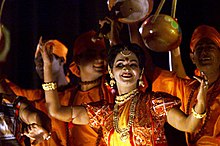Music of Bengal
| Music of Bangladesh | |
|---|---|

|
|
| Genres | |
| Specific forms | |
| Religious music | |
| Ethnic music | |
| Traditional music | |
| Media and performance | |
| Music awards | |
| Music festivals | |
| Music media |
Radio Television Internet |
| Nationalistic and patriotic songs | |
| National anthem | Amar Sonar Bangla |
| Other |
Notuner Gaan (National March) Ekusher Gaan (Ode to the Language Movement) |
| Regional music | |
| Related areas | |
| Other regions | |
Radio
Television
Internet
Bengali music (Bengali: বাংলা সংগীত) comprises a long tradition of religious and secular song-writing over a period of almost a millennium. Composed with lyrics in the Bengali language, Bengali music spans a wide variety of styles.
Bengal is today split between the Indian state of West Bengal and the independent country Bangladesh.
The earliest music in Bengal was influenced by Sanskrit chants, and evolved under the influence of Vaishnav poetry such as the 13th-century Gitagovindam by Jayadeva, whose work continues to be sung in many eastern Hindu temples. The Middle Ages saw a mixture of Hindu and Islamic trends when the musical tradition was formalized under the patronage of Nawabs and the powerful landlords baro bhuiyans.
Much of the early canon is devotional, as in the Hindu devotional songs of Ramprasad Sen a bhakta who captures the Bengali ethos in his poetic, rustic, and ecstatic vision of the Hindu goddess of time and destruction in her motherly incarnation, Ma Kali. Another writer of the time was Vidyapati. Notable in this devotional poetry is an earthiness that does not distinguish between love in its carnal and devotional forms; some see connections between this and Tantra, which originated some time in the middle of the first millennium CE.
The Bishnupur Gharana is the sole Classical (Drupad) gharana of Bengal . It originated in Bishnupur, Bankura by the court musicians of the Malla Kings. Bahadur Khan of Delhi, a descendant of the Tansen, was the father of Bishnupur Gharana. Bahadur Khan was brought to Bishnupur by Malla King Raghunath Singha II.
...
Wikipedia
